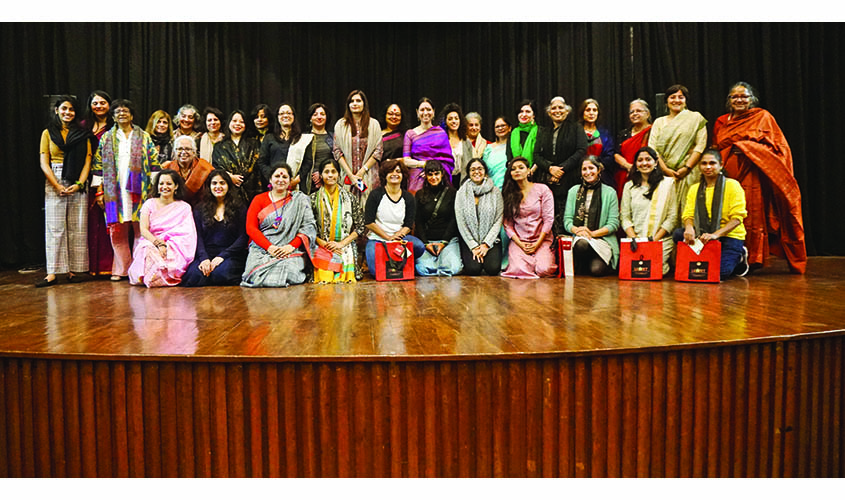The roles essayed by women in the film industry have changed substantially in recent times. Actresses have gone from playing second fiddle to heroes to taking centre stage. Women filmmakers are weaving stories that impact society. In short, female voices have made a space for themselves in the world of cinema.
The 15th IAWRT Asian Women’s Film Festival was held from 5-7 March at the India International Centre in New Delhi. The festival brought a talented pool of Asian women filmmakers under one roof to get them recognition by showcasing their unique projects. First hosted in 2005, this annual film festival, organised by the International Association of Women in Radio and Television (IAWRT) India, is held around the same time of the year, to coincide with International Women’s Day.
This year, the festival received over 700 applications from 37 countries. Out of these, a package of 51 films was curated, from 20 countries, including Bangladesh, Estonia, Iran, Israel, Sri Lanka, Syria, Turkey, Georgia and more, besides various Indian cities.
While the subjects of the films varied, most of them had a strong female perspective. For instance, a short film by filmmaker and actor Divya Unny, Her First Period, aims to fight the taboo around menstruation. The film has over 1.7 million views on YouTube. Unny told us about the idea behind this film: “People must realise that menstruation is a part of life and should not be treated as a hindrance to the lives of girls who are the future of our country. Many girls from educated families stay at home for the first three days of their period. These are the families that need to tell their children that you are not unwell if you are on your period. It’s an everyday conversation we need to have with our girls and our boys, and we need to do it as much as possible. It should be as normal as life itself.”
She added, “There are so many women around the world facing so many challenges and you realise that it’s much more important to fight that mindset through your stories. As a filmmaker, writer or as an actor, my stories are my weapon. I may implement empowerment in my everyday life, but if I want to make a larger impact, it’ll be through cinema. It’s the most powerful tool.”
One of the highlights of the film festival, according to Unny, is the exchange it makes possible between filmmakers from various countries. This year, in addition to the general category of screenings, segments like “Female Gaze”, “Childhood” and “Seven Sisters” (showing films from Northeast India) were introduced. NupurBasu, Managing Trustee, IAWRT Chapter India, said, “The 15th edition of the IAWRT Asian Women’s Film Festival is being held at a time when women in cinema are central to world discourse in many ways. Discussions about women’s participation in cinema, and the Me Too campaigns in the film industry—from Hollywood to the 900-film-a year Indian film industry—has put women in cinema at the heart of several critical discussions. So ‘Female Gaze’ organically became the theme of our festival’s 15th edition.”
A non-fiction short film that received much appreciation from the audiences in the “Seven Sisters” category was River Story by filmmaker Yapangnaro Longkumer from Nagaland. The film follows Zaren, a first generation fisherman, trying to navigate his way through modern life.
Longkumer hopes to have a global audience for her film: “I want the film to find resonance in other places of the world where the people living on the margins are being challenged by the gatekeepers of modernisation. For example, people living around the Doyang Dam [in the Wokha district in Nagaland] now have to adapt to a new way of life. But is this trade for a new life worth the price of the old?” She talked about women stepping into filmmaking in her state. “The few of us who have ventured into documentary filmmaking in Nagaland are mostly women. Maybe because this gives us a space to tell stories in a landscape where men hold the reins,” she said.
Apart from the film screenings, the festival this year included several programmes. Day 1 witnessed a roundtable on “Me Too in the Indian media and film industry”. A two-day workshop was held with school girls titled “Little Directors”. The event also featured an art installation, “Bioscopewalli”, mounted by design students and artists.
The festival was an opportunity for young filmmakers to showcase their work and learn from each other. Iranian filmmaker Iris Ben Moshe’s Broken Pipe was also screened here—the film’s first screening in India. It is a simple story on family dynamics, about how older people deal with loneliness and difficulties. On her choice of this topic, Moshe said, “Cinema these days, despite far-reaching changes, still preserves the masculine gaze that prefers beauty and eternal youth to loneliness and aging. Aging, and its personal and social complexities is a foreign and alienated subject. In real life, aging tends to surprise us, even though we all know that it is waiting for us around the corner.”
Moshe said she was delighted with her experience at the IAWRT Film Festival. She said, “During the festival I watched films by filmmakers from around the world. These women were different from me in culture and language, but the films showed me how feminine experience is universal. I think that collaborations between women filmmakers are important political acts that can change attitudes towards women, and especially towards women who are filmmakers on a world-class level.”

